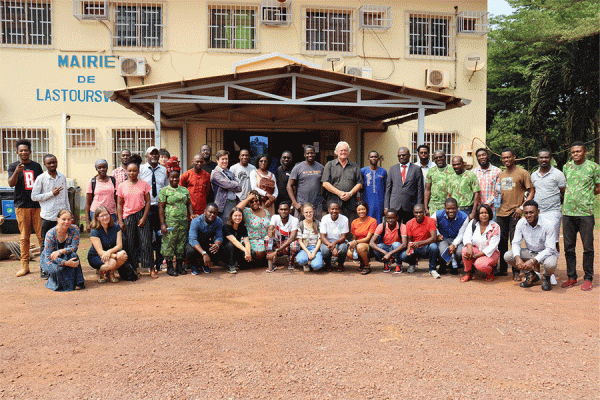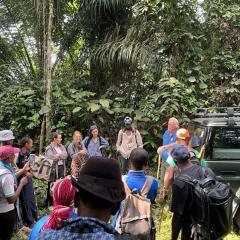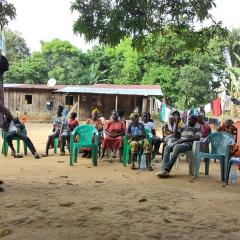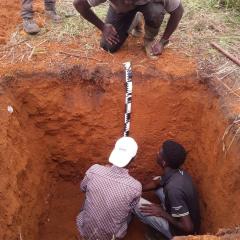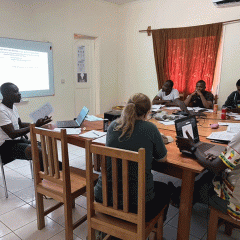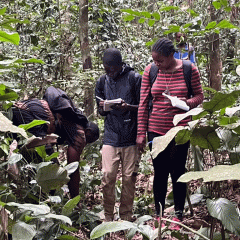This past summer University of New Orleans biological sciences professor Nicola Anthony immersed herself in the culture and ecology of the tropical forest and rural villages in the central African country of Gabon as part of a research field school aimed at training the next generation of conservation scientists.
For three weeks, Anthony helped lead a group of international scientists and students in the field-based biodiversity research program organized through ECOTROP, the Ecole de Terrain en Ecologie Tropicale.
ECOTROP is a field training program in tropical ecology supported through Anthony’s endowment and by an 11-member consortium, of which UNO is a member. Funding and technical support are also provided through the Université des Sciences et Techniques de Masuku, University of Omar Bongo and National Park service in Gabon, and the French Research Institute for Development and Agricultural Research for International Development.
Anthony holds the University of New Orleans Freeport-McMoran Chair in Wildlife Sustainability. She is also a member of the steering committee of the newly founded Congo Basin Science Initiative that aims to promote conservation and education across the region.
Gabon is dominated by tropical forests and is an important stronghold for many forest mammals, Anthony said.
“The goal of the field school is really to provide students with training in what we might refer to as biodiversity sciences or field-based biodiversity sciences,” Anthony said. “So, we have different working groups focused on different aspects of biodiversity and the environment.”
The school is designed to provide students with knowledge and skills in various fields such as the study, management and conservation of biodiversity, geology, geography, soil sciences, archaeology and environmental anthropology.
The overall research goal of this project is to understand how past human history has affected current levels of biodiversity. Specifically, the team hypothesizes that former village sites may promote biodiversity through greater soil fertility and the deliberate planting of beneficial trees.
Last summer, Anthony said, there were four main research groups: An archaeological group that examined human history in caves around Lastourville; a soil science group that looked at the structure and composition of the soil at sites where humans were present and where humans were absent; an ethno-botany team that researched the medicinal and edible plants in the forests and interviewed villagers to find out their uses; and the wildlife group that inventoried large mammals through camera trap surveys and worked with villagers on patterns of hunting in the area.
“Basic field training in the tropics is really important because it provides people with opportunities to further their careers and it also builds greater awareness of the environment and the problems that the environment faces,” Anthony said. “It brings people to work directly with local communities and see why the work they do in the field can be important for conservation.”
UNO graduate student Emily Bowers, who is pursuing a master’s degree in biology, participated in the field school in 2022.
“The forests in Gabon are described as the ‘last stronghold of the African forest elephant,’ and there are numerous endangered species in these forests. Learning about conservation techniques in a place that is full of biodiversity was priceless and amazing,” Bowers said. “This type of research is important because biodiversity is important to maintain healthy ecosystems on the Earth.”
The trip to Gabon was Bowers’ first trip outside of the United States, and she said she learned about Gabonese culture and bridging the gap of communication with people who did not speak the same language as she did.
“I also learned how complicated conservation issues and policies are; balancing economic issues with conservation issues is definitely a tight-rope walk,” Bowers said.
Awdrea Lysiane Ibinga Manga of Gabon participated in the school for two years—once as a student and then as a National Park representative for her country. Ibinga Manga, who arrived at UNO this fall, is looking to pursue a master’s degree in biology.
“This field school allowed me to make the decision to continue my studies in biology,” said Ibinga Manga, who wants to pursue a career as a conservation biologist and focus on biodiversity in her country.
Anthony, who has been a part of field research schools in Gabon for two decades, said she appreciates the natural beauty of the area and the welcoming nature of the people of Doume, the isolated village located along the Ogooué River where most of their research takes place.
“We camp in the village, and we spend a lot of time interacting with the people who live there,” Anthony said. “It allows you to appreciate how other people live their lives. Not everyone has the privilege, in my opinion, of living in a Gabonese village and learning about their culture and relationship with the forest.”


